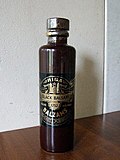Balsam (drink)

Balsam is a type of herbal liqueur that is traditionally made from a blend of various herbs, roots, berries, and spices, steeped in alcohol. It is known for its strong, distinctive flavor and medicinal properties, having been used historically for both its healing benefits and as a digestif. Balsams are particularly popular in Eastern and Northern Europe, with each region having its own unique recipes and variations.
History[edit]
The origins of balsam can be traced back to ancient times, when it was used by monks and herbalists to prepare medicinal tinctures. The exact history varies by region, but it is generally agreed that balsams were initially created for their health-giving properties, before becoming appreciated as a beverage. Over time, the production of balsam evolved from a small-scale, medicinal preparation into a commercial product, with many countries developing their own distinctive brands and recipes.
Production[edit]
The production of balsam involves macerating various herbs, spices, and botanicals in alcohol. The specific ingredients and their proportions vary widely, contributing to the unique character of each balsam. After maceration, the mixture is often aged in oak barrels for several months to develop its flavors. The final product is typically dark in color, with a complex, bitter-sweet flavor profile.
Types[edit]
Several countries are known for their own versions of balsam. For example:
- Riga Black Balsam: Perhaps the most famous balsam, originating from Latvia. It is known for its rich, complex flavor and has been produced since the 18th century.
- Jägermeister: A well-known German herbal liqueur, often considered a type of balsam due to its herbal composition and digestive properties.
- Unicum: A Hungarian herbal liqueur, made from more than 40 herbs and aged in oak barrels. It is a bitter, tonic-like balsam.
Culinary Uses[edit]
Balsam can be enjoyed in several ways. It is traditionally served neat or with ice as a digestif. It can also be used as an ingredient in cocktails, adding a herbal complexity to drinks. In some regions, balsam is added to coffee or used as a flavoring in cooking and baking.
Medicinal Properties[edit]
Historically, balsam was valued for its supposed health benefits, including aiding digestion, relieving cold symptoms, and acting as a general tonic. While these claims are largely anecdotal, the herbs and spices used in balsam are known to contain various beneficial compounds.
Cultural Significance[edit]
Balsam holds a special place in the cultures of the countries where it is produced, often associated with tradition, hospitality, and health. It is frequently consumed during celebrations and festive occasions, and is also given as a gift.
-
Rigas Balzams
Ad. Transform your life with W8MD's Budget GLP-1 injections from $75


W8MD offers a medical weight loss program to lose weight in Philadelphia. Our physician-supervised medical weight loss provides:
- Weight loss injections in NYC (generic and brand names):
- Zepbound / Mounjaro, Wegovy / Ozempic, Saxenda
- Most insurances accepted or discounted self-pay rates. We will obtain insurance prior authorizations if needed.
- Generic GLP1 weight loss injections from $75 for the starting dose.
- Also offer prescription weight loss medications including Phentermine, Qsymia, Diethylpropion, Contrave etc.
NYC weight loss doctor appointmentsNYC weight loss doctor appointments
Start your NYC weight loss journey today at our NYC medical weight loss and Philadelphia medical weight loss clinics.
- Call 718-946-5500 to lose weight in NYC or for medical weight loss in Philadelphia 215-676-2334.
- Tags:NYC medical weight loss, Philadelphia lose weight Zepbound NYC, Budget GLP1 weight loss injections, Wegovy Philadelphia, Wegovy NYC, Philadelphia medical weight loss, Brookly weight loss and Wegovy NYC
|
WikiMD's Wellness Encyclopedia |
| Let Food Be Thy Medicine Medicine Thy Food - Hippocrates |
Medical Disclaimer: WikiMD is not a substitute for professional medical advice. The information on WikiMD is provided as an information resource only, may be incorrect, outdated or misleading, and is not to be used or relied on for any diagnostic or treatment purposes. Please consult your health care provider before making any healthcare decisions or for guidance about a specific medical condition. WikiMD expressly disclaims responsibility, and shall have no liability, for any damages, loss, injury, or liability whatsoever suffered as a result of your reliance on the information contained in this site. By visiting this site you agree to the foregoing terms and conditions, which may from time to time be changed or supplemented by WikiMD. If you do not agree to the foregoing terms and conditions, you should not enter or use this site. See full disclaimer.
Credits:Most images are courtesy of Wikimedia commons, and templates, categories Wikipedia, licensed under CC BY SA or similar.
Translate this page: - East Asian
中文,
日本,
한국어,
South Asian
हिन्दी,
தமிழ்,
తెలుగు,
Urdu,
ಕನ್ನಡ,
Southeast Asian
Indonesian,
Vietnamese,
Thai,
မြန်မာဘာသာ,
বাংলা
European
español,
Deutsch,
français,
Greek,
português do Brasil,
polski,
română,
русский,
Nederlands,
norsk,
svenska,
suomi,
Italian
Middle Eastern & African
عربى,
Turkish,
Persian,
Hebrew,
Afrikaans,
isiZulu,
Kiswahili,
Other
Bulgarian,
Hungarian,
Czech,
Swedish,
മലയാളം,
मराठी,
ਪੰਜਾਬੀ,
ગુજરાતી,
Portuguese,
Ukrainian

